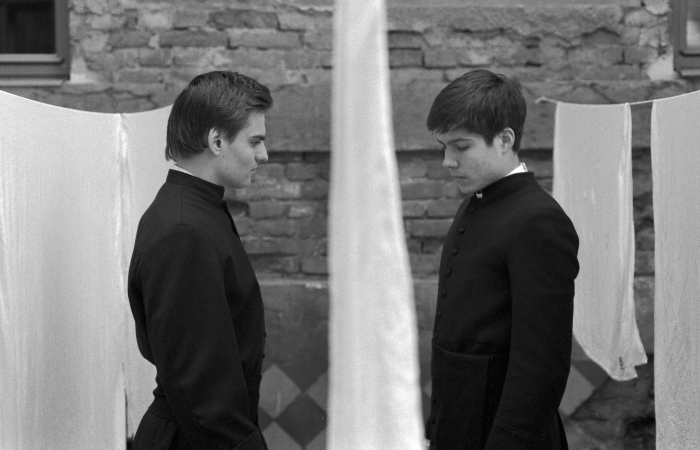“Servants,” a film in Slovak directed by Ivan Ostrochovský that saw an initial premiere in 2020, captures an experience of being constantly seen.
In short, the movie — which runs for just under an hour and a half — follows two students at a Catholic theological school who encounter the far-reaching control of the then-Communist regime in Czechoslovakia, where the film is set. The inherent promise of the United States and so much of the modern world, which is spoken in speech after speech, is some kind of freedom to experiment with self-determination, though the presentation of these characters’ intense, inward struggles in “Servants” makes this internal — and sometimes external — stand-off feel easily connected to present-day circumstances alongside the perspective the movie provides about what life was like.
The Uneasiness of Black and White
The movie is in black and white, and with this feature as a key factor, the sum total of the lighting and coloration choices makes “Servants” look like a place where everything is either seen or in danger of being seen at all times. Perhaps because of an instinctual association in the human brain between the lightness on a palette of black and white and actual light, it’s as though light emanates in this movie from entirely unnatural places, shining without regard for ordinary physical constraints like those associated with the natural world’s light sources.
Yet, in an emotional sense, there is not a feeling of lightness in this movie. Character movements sometimes look substantially weighed down, as though these figures’ souls are somehow bound to massive lead weights. You don’t even get the sense that the black and white coloration of the movie is necessarily obscuring any vibrant palette of color. Characters very often appear in garb associated with the path of faith in Catholicism — garments that feature mostly uniform colors and styles.
Even in that element of “Servants,” it’s clear the themes the movie explores don’t end with the demise of the historical Communist regime that provides a backdrop for these characters, some of whom decide to stage quiet resistance, including with something as straightforward as conducting religious acts outside of government-aligned environments.
Some of the sights in “Servants” even more straightforwardly exemplify the idea of being seen by an all-seeing eye of sorts. Repeatedly, the film utilizes shots from overhead of an enclosure seemingly on seminary grounds, explicitly bringing the physical context of where these characters are living and learning into the experience of their personal lives. In short, they’re literally enclosed.
Quietly Rebelling for Faith
In a hushed call that one character makes in a phone booth just before 30 minutes into the movie, that figure — who has helped introduce Juraj, played by Samuel Skyva, to the religious resistance activities — proclaims that restrictions placed on the circulation of literature among the seminary students threaten the very foundation of their faith. “Therefore, to prohibit it is to silence the word of God,” the fellow seminarian tells an office of Radio Free Europe. What’s really striking, though, is the very quiet and quickened tone in which he says this.
Think about it. How easy is it to imagine those very words thundered in a sermon from one of the many televised preachers who dot American airwaves and probably will indefinitely? The contrast highlights the unique nature of what is being presented in “Servants.” It’s a core of confidence blended with trepidation that’s founded in the basic understanding of where the power in this entire slow-motion stand-off actually rests — with the government.
In a scene not long after the quiet phone call, we see government agents go after a figure who helps lead those launching their religious resistance — and the movie cuts to another scene before these figures even get inside the man’s apartment. Not that long afterwards, he’s dead, and a radio broadcast about the religious figure’s brutal demise is playing. In terms of what was shown onscreen, there wasn’t even a struggle.
The Government is Always There
That’s the part of this stand-off with a totalitarian force that’s external which “Servants” captures, and the movie extends that perspective to showing, in remarkable detail, how these individual characters behave under this kind of threat. In “Metronom,” which is also set under a totalitarian regime and was featured at the New York City festival New Directors/New Films this year, there is a similar component. In one scene in that movie, a father is — in utter desperation — trying to get his daughter, who’s been taken into custody, to comply with what’s needed for her release. Strikingly, he too was doing so in very quiet tones, no matter the extreme nature of what he was actually saying.
It affects the soul. And on a macro level, that’s part of what makes governance so relevant, because even if it’s presented in muddled terms, the inward connection is there.
See more at this link.
Featured image: Film Movement
You may also like
-
Five Standout Artists Not To Miss from 2024’s 1-54 New York: Art Fair Recap
-
“Resia Schor: War and Peace” at Satchel Projects in New York City: Exhibition Review
-
“Alice Baber: Reverse Infinity” at New York City’s Berry Campbell: Exhibition Review
-
“taken through back entrances subtle fate matching matte thing soiled …” by Ser Serpas at the Whitney: Art Installation Review
-
“Houses and Hotels” from Donna Dennis at O’Flaherty’s in New York: Exhibition Review
